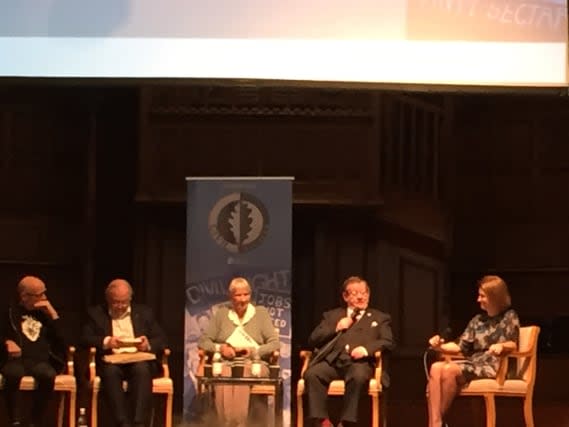‘Euphoria’ followed violence at Londonderry civil rights protest

Police violence against the Duke Street civil rights march prompted “euphoria” among participants, one of the organisers said.
Fionnbarra O’Dochartaigh said the Royal Ulster Constabulary’s (RUC) use of batons in Londonderry 50 years ago helped galvanise the movement and brought about far-reaching change.
The “bubble” of rising resentment surrounding perceived injustices against Catholics in areas like the allocation of public housing had burst in Derry.
He said: “After the batons came out things could not be the same again.”
Mr O’Dochartaigh said he knew that there was going to be trouble at Duke Street, on the eastern bank of the River Foyle which divides the city.
“I certainly expected it, I wore a crash helmet.”
He added: “The bubble was going to burst somewhere and it broke here in Derry.”
He took part in a debate on the legacy of the march for rights like one man, one vote, which was held at the city’s Guildhall.
Mr O’ Dochartaigh said: “I knew that we were no longer defeated, I knew inside me despair would dissipate and I hoped possibly the civil rights movement could not just change the laws but help to change the economy and men would no longer be on the dole.”
Veteran socialist and former Stormont Assembly member Eamonn McCann said nobody consciously or deliberately prompted the trouble, or expected events to take the trajectory which they did.
He recalled: “I knew that something huge had just happened but I was not sure what it was.”
Erskine Holmes, then a teacher without any criminal convictions and a member of the Northern Ireland Labour Party, said the police were wrongly convinced the protesters were associated with the IRA.
He said the RUC cordon was initially thin and the officers stood with arms linked. It did not take long for batons to come out.
He ended up under a police officer’s arm and only avoided being hit with a baton because an RTE camera crew was present.
Mr Holmes recalled: “Once that door bangs, you are inside a police cell, you realise you are in a different position to where you have ever been in your life.”
Mr Holmes speculated that an insult hurled at police by then MP Gerry Fitt during a previous protest in Co Tyrone had marked him out for trouble.
He said Northern Ireland was different from protests in Paris and elsewhere.
“It is that primal feeling that the police represent the state and they want to live in a different state,” he said.


